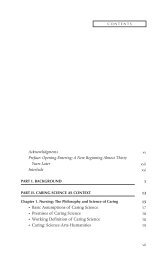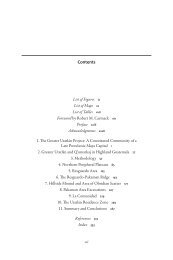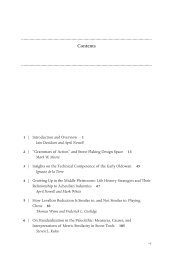free download - University Press of Colorado
free download - University Press of Colorado
free download - University Press of Colorado
Create successful ePaper yourself
Turn your PDF publications into a flip-book with our unique Google optimized e-Paper software.
Jago Cooper<br />
Summary and Future Research<br />
The intentionality behind human decision-making processes is challenging to<br />
identify through archaeological data alone. Consequently, it is very difficult to<br />
differentiate between deliberately planned disaster management strategies that<br />
have been intentionally adopted and cultural practices that have the benefit <strong>of</strong><br />
mitigating potential hazards. Therefore this chapter is not arguing for a monocausal<br />
link among Precolumbian household architecture, settlement location,<br />
food procurement strategies, interaction networks, and the dangers <strong>of</strong> sudden<br />
environmental change. Rather, it uses paleoclimatic and paleoenvironmental<br />
data at different spatial and temporal scales to identify the hazards experienced<br />
by Precolumbian populations in the Caribbean. It then uses detailed<br />
archaeological investigation at different spatial and temporal scales to assess<br />
the potential resilience <strong>of</strong> their lifeways to these impacts, occasionally using<br />
modern-day comparisons for contrast (Peterson and Broad 2009). This study<br />
suggests that hazards need to be considered as culturally contingent and based<br />
on the ecological knowledge with which societies understand the nature and<br />
threat <strong>of</strong> potential hazards. In the Caribbean, Precolumbian lifeways appear to<br />
have <strong>of</strong>fered some important advantages in mitigating the impacts <strong>of</strong> known<br />
hazards in the region. These advantages helped mitigate the impacts <strong>of</strong> hazards<br />
and reduced the vulnerability <strong>of</strong> Precolumbian communities to sudden environmental<br />
change.<br />
The scaled temporality <strong>of</strong> hazard return rates in the Caribbean raises the<br />
interesting topic <strong>of</strong> intergenerational knowledge transfer and the cultural<br />
transmission <strong>of</strong> ecological knowledge over time. Archaeology, through case<br />
studies such as this one from the Caribbean, provides a deep time perspective<br />
<strong>of</strong> human engagement with environmental change that challenges the use <strong>of</strong><br />
concepts such as stability and equilibrium. The constantly changing dynamics<br />
<strong>of</strong> human-climate-environment relations need to be understood in terms <strong>of</strong><br />
flux rather than equilibrium; therefore hazards can only be properly understood<br />
within their individual geographic, temporal, and cultural contexts. In<br />
the Caribbean, archaeology provides one <strong>of</strong> the few tools available to access this<br />
important knowledge following the loss <strong>of</strong> an entire way <strong>of</strong> life after European<br />
contact. Therefore archaeologists can make an important contribution to<br />
ongoing debates over disaster management in the Caribbean where concepts<br />
<strong>of</strong> threat, vulnerability, and resilience can be better understood using the time<br />
depth <strong>of</strong> human experience. In this way, archaeologists should be involved in<br />
future disaster management strategies to enable a better understanding <strong>of</strong> hazards,<br />
provide critical discussion <strong>of</strong> potential mitigation strategies, and contribute<br />
to a wider interdisciplinary debate that enables modern-day communities to<br />
avoid the impending dangers <strong>of</strong> sudden environmental change in the region.<br />
Future research needs to concentrate on providing more interdisciplinary<br />
case studies in which paleoclimatic, paleoenvironmental, and archaeo-<br />
106





